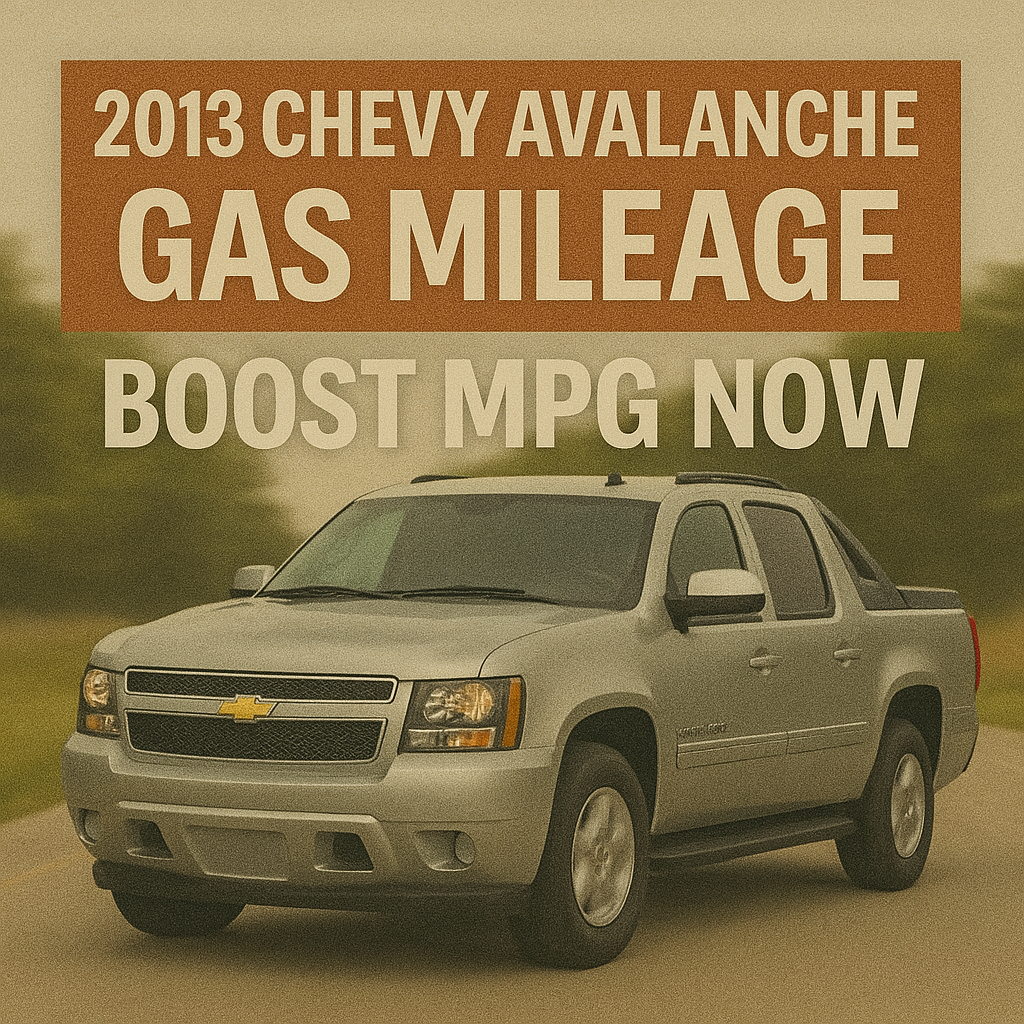Drive a 2013 Chevrolet Avalanche? You already know it’s tough and versatile. But what if you could keep that muscle and still use less fuel? The good news: you can. These small changes will help you get more miles from every tank — without giving up performance.
⚡ First Upgrade: Throttle Booster
Factory throttle response in the Avalanche is intentionally soft. This leads to over-acceleration and fuel waste. A throttle booster sharpens your pedal input, giving you better control and smoother takeoff. Less wasted motion means more MPG.
🚀 Get One Now: Top Throttle Booster for 2013 Chevy Avalanche Plug it in. Activate Eco Mode. Drive smarter today.
📉 Why MPG Drops in the Avalanche
⛽ Expected MPG: Usually 13–17 depending on use and terrain.
🛑 Delayed throttle: ECU tuning prioritizes comfort over efficiency.
📦 Weight matters: Carrying tools, gear, or towing regularly lowers mileage even further.
📊 What Drivers Are Actually Getting
| Driver | Before | After | Experience |
|---|---|---|---|
| FinalEdition13 | 13.9 MPG | 15.8 MPG | “Throttle response feels tuned. MPG went up after install.” |
| UtilityKing | 14.2 MPG | 16.3 MPG | “Cruising in Eco mode gave better mileage on longer trips.” |
🧰 Practical Tips That Work
📏 Inflate your tires properly: Even 2 PSI off affects fuel use. 🧼 Air filter swaps: Don’t wait until it’s clogged — replace regularly. 🛠️ Fresh spark plugs: These tiny parts make a big MPG impact.
🛢️ Synthetic oil helps: Smoother flow = less engine drag. 📦 Reduce load: Empty your cargo bed when not needed.
📈 Upgrade Options Compared
| Upgrade | Cost | MPG Benefit | Effort |
|---|---|---|---|
| Throttle Booster | $150–$300 | 🔼 Moderate | 🟢 Easy install |
| Cold Air Intake | $250–$500 | 🟡 Low | 🔧 Some tools |
| Performance Tune | $500–$1000 | 🔼 High | 🔴 Professional |
💬 Final Word: Easy Wins for a Big Truck
The 2013 Chevrolet Avalanche isn’t light — but it can run lean. The throttle booster, paired with minor upgrades and weekly habits, gives you control over fuel costs without touching the engine.
📦 Click to Save: Order the Throttle Booster for Your 2013 Chevy Avalanche
🔍FAQs: 2013 Chevy Avalanche Gas Mileage Questions
Does a cold air intake improve gas mileage?
Yes — especially on V8 trucks like the Avalanche. A cold air intake (CAI) improves airflow to the engine, reducing restriction and potentially improving fuel efficiency by 1–2 MPG during highway driving.
⚠️ Pairing a CAI with a throttle controller can also help smooth out acceleration and reduce unnecessary fuel dumps.
Does a bed cover improve gas mileage?
Yes ✅ — installing a hard or soft tonneau cover helps reduce drag by smoothing airflow over the truck bed.
🛻 Many Avalanche owners report 5–10% MPG gains at highway speeds when using a quality tonneau cover.
Does a camper shell improve gas mileage?
It depends. A camper shell can either reduce or increase aerodynamic drag depending on its shape and how it’s integrated with the cab.
⚠️ Flush-mounted, low-profile shells may help MPG, while taller ones often hurt it.
Will an oil change increase gas mileage?
Absolutely. Dirty oil increases friction and reduces efficiency in large displacement engines like the 5.3L V8.
🛢️ Switching to a high-quality synthetic 5W-30 can improve fuel economy, especially when towing or hauling.
Can new spark plugs increase gas mileage?
Yes. Replacing old or fouled plugs can restore combustion efficiency and prevent misfires, which directly impacts fuel economy.
🔧 Consider upgrading to iridium spark plugs for longevity and better idle quality.
Do properly inflated tires help increase gas mileage?
Yes — and tire pressure matters even more on heavy trucks.
📏 Recommended PSI for the 2013 Avalanche: 35 PSI (front/rear, under normal load).
🛞 Low pressure = more rolling resistance = lower MPG.
Do new tires improve gas mileage?
They can — especially if you’re replacing off-road or aggressive tread tires with all-seasons or highway terrain options.
💡 Look for tires marked “low rolling resistance” or those designed for fuel efficiency.
Does dual exhaust improve gas mileage?
Not typically. On the Avalanche’s V8, dual exhaust may increase performance but has minimal effect on fuel economy.
🔥 It may sound better, but your MPG gains will likely be negligible unless paired with engine tuning.
Do fuel additives improve gas mileage?
Sometimes — especially if your fuel system is dirty. Additives like Chevron Techron can clean injectors and restore MPG.
🧪 Use sparingly — 1 bottle every 3,000–5,000 miles is usually enough.
Does a better air filter improve gas mileage?
Yes — especially if your current one is dirty.
🌬️ Reusable high-flow filters can increase airflow, though benefits are subtle without other intake mods.
Can a tune-up improve gas mileage?
Yes — particularly if the vehicle has high mileage or hasn’t had regular maintenance.
🧰 A tune-up on the Avalanche should include plugs, coils, air filter, fuel system cleaning, and a throttle body inspection.
Do headers improve gas mileage?
Unlikely. Long-tube headers can boost horsepower, but usually at the cost of low-end torque and fuel efficiency.
⚠️ Unless you’re re-tuning the engine, the MPG benefit is minimal.
Do hydrogen generators improve gas mileage?
No. Despite claims, there’s no scientific evidence that hydrogen kits reliably increase MPG in modern vehicles.
🚫 Many are scams or ineffective add-ons. Avoid.
Does a catalytic converter improve gas mileage?
A functioning one does. A clogged catalytic converter can restrict exhaust flow, reduce engine efficiency, and hurt fuel economy.
🧪 If you’re losing MPG and see a check engine light, have your cat tested.
